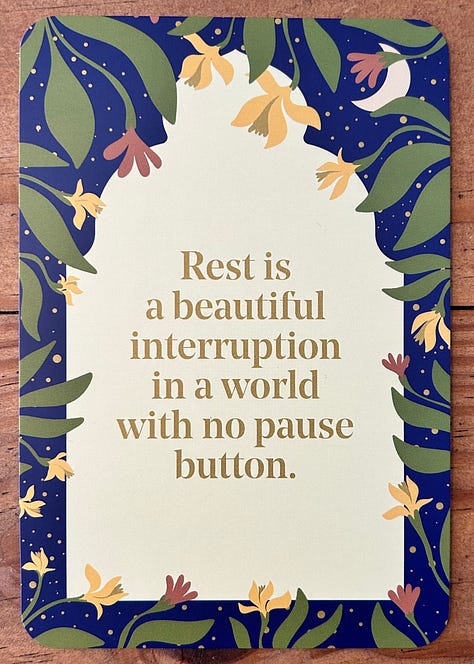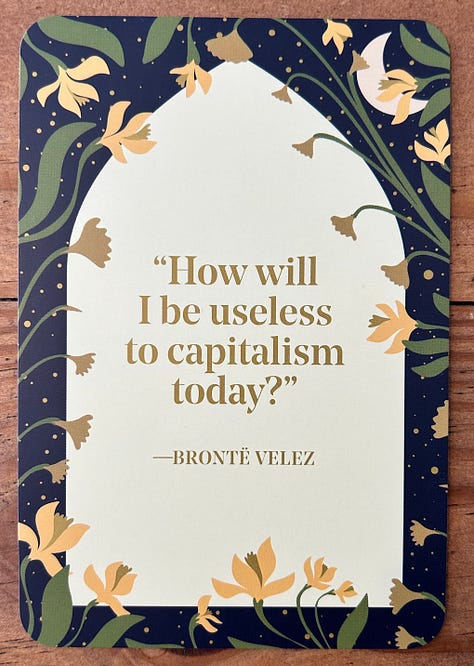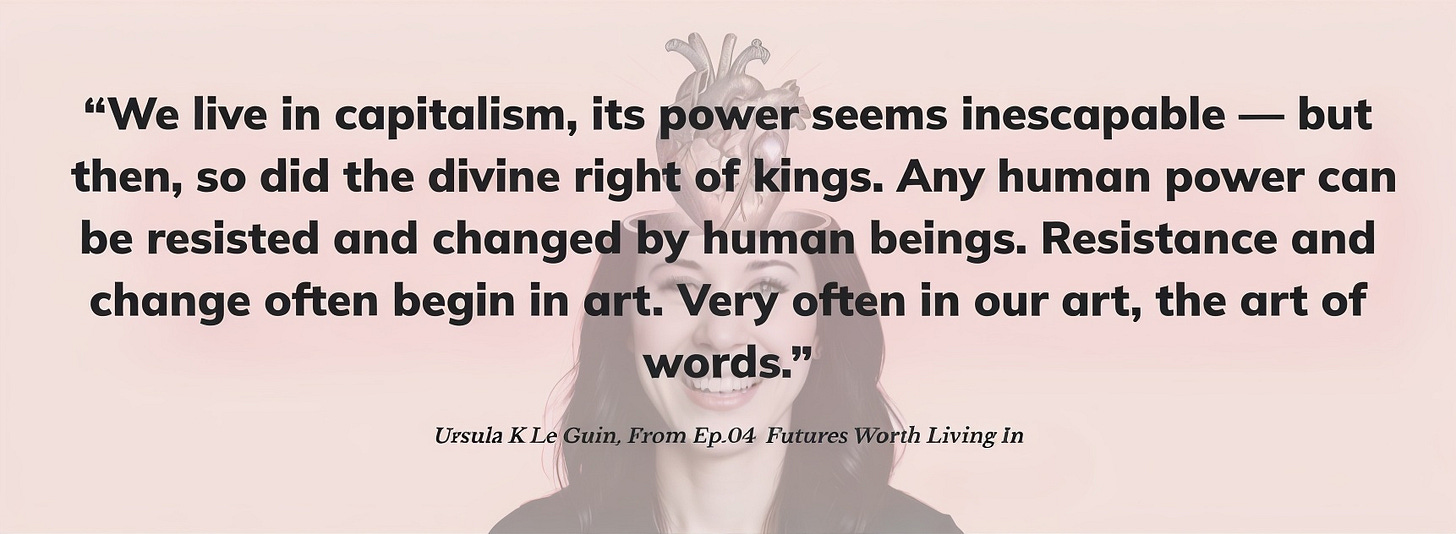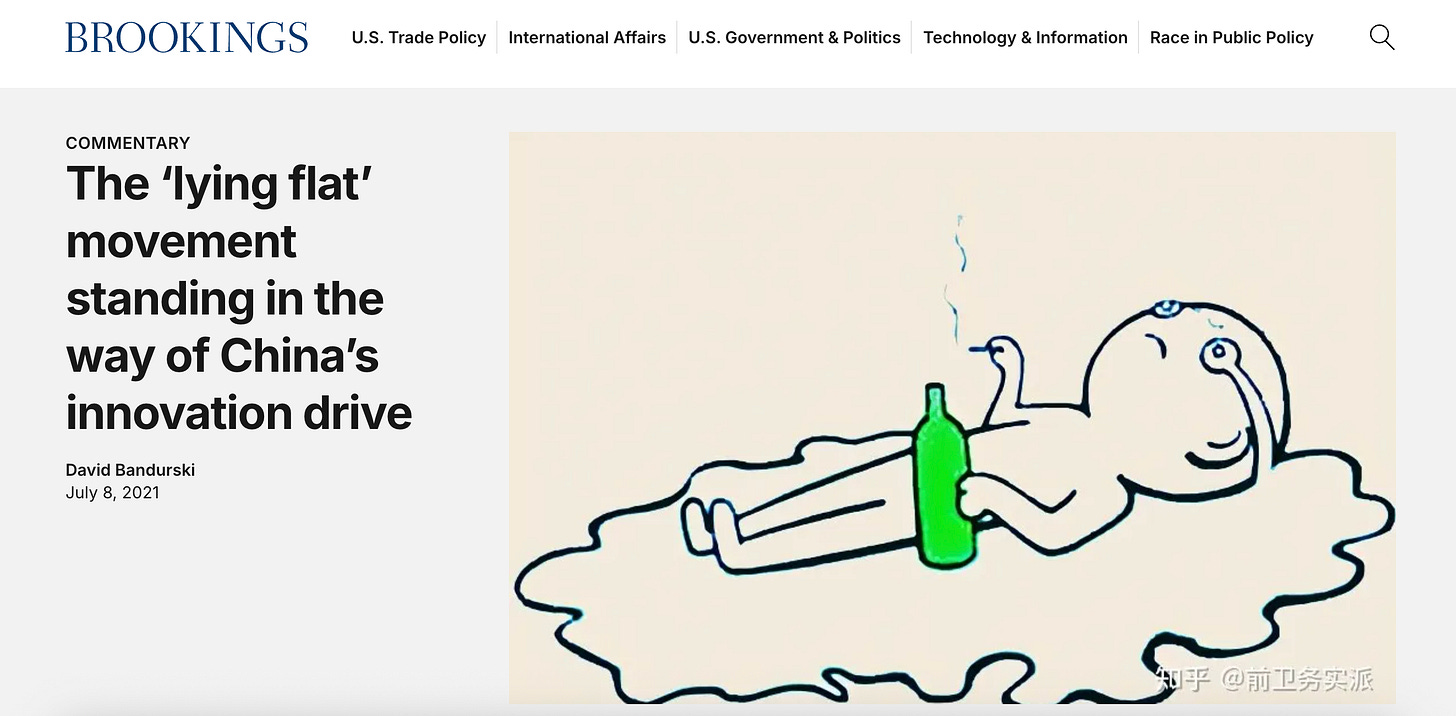More from f*ck i love you
the fily (audio)files audio essays | Spotify | Apple Podcasts
f*ck i loved that the pod | Spotify | Apple Podcasts
If you prefer, you can listen to me read this week’s post. I’d suggest this one is worth your time. It starts to answer a critical question the pod does not: how to get from here to futures worth living in.
o0. Contents
o1. This Week’s Holy F*ck Moments
o2. Note From Jenn
o3. Today’s Notebook
o4. Featured Substackers
o1. This Week’s Holy F*ck Moments
Capitalism's need for scarcity is not a bug — it’s a feature. Colonial powers engineered hunger by restricting land access and taxing in cash to force people into wage labor, revealing that artificial scarcity is a core driver of capitalist growth.
Degrowth isn’t austerity — it’s abundance. By expanding universal public goods like housing, transit, and internet, degrowth flips the script, using abundance itself to end the growth imperative.
AI-enhanced productivity can enable liberation. When paired with post-labor economics, AI gains don’t drive profit — they reduce work, decouple well-being from resource use, and free up time for life.
A small Brazilian city is already funding UBI through oil profits. Maricá pays a monthly income in local currency to 25% of its population using municipal oil revenues — and plans to extend it to everyone.
Digital infrastructure may renew the social contract — or destroy it. From iris-scanning crypto to blockchain-verified diplomas, emerging tech could shift power back to citizens — or deepen surveillance and central control.
o2. Note From Jenn
Hello friends!
Somehow it’s Friday again, and this is the fourth! episode of f*ck i loved that, my weekly info dump synthesis. Given I self-describe as consistently inconsistent this is a big accomplishment.
Also, we’ve already had over 1000 downloads…With no marketing and a small but mighty community of listeners…which is… wild. My jaw is still on the floor.
All I can say is:
I f*ckin’ love ya’ll 😭
Last Week’s Episode
Reflections on This Week’s Episode
We left off last week — and Welfare Queen Part 3 [WQ3] — with a promise ‘it’s not all bad, even if we have to understand how bad it really is, first.’
I told you that our agency matters, that my intent isn’t paralysis by doomerism, but a necessary and honest assessment of where we are. You wouldn’t go on a multi-day hike without a map, so we shouldn’t be without one trying to navigate an historical transformation.
The WQ series is my best attempt at a You Are Here Now map.
I also promised you there were more maps to come — along with requisite navigational ‘New North Stars’ for how we might find our way out of the shit storm. I previewed them at the end of WQ3, but today we go deeper.
That said, something the episode does not address that’s on my mind, is the issue of how these dozens of possible economic alternatives get made real. How we get from here to there, to fundamentally different experience in our daily lives.
Sure it’s good to know there are models, but most of us have had our agency sort of strip mined just trying to survive business as usual — a.k.a. Zombie Work as
called it in his viral piece you should really read, The Cult of Productivity is Breaking People.Then there’s the issue that this cult is quite firmly held in place by massive and frightening power imbalances between us, workers, the state and capital, a.k.a. The One Percent. As we learned in WQ2, the state largely exists to enable private capital at the expense of our collective wellbeing. Most Western states were ‘captured’ by private interests long ago, but the dial has been cranked to 10 of late.
We live among tech companies worth more than 96% of all nations — including Canada — and technologists — a.k.a. The Broligarchy — who say things like this:
"The basic idea was that we could never win an election on getting certain things because we were in such a small minority. But maybe you could actually unilaterally change the world without having to constantly convince people and beg people and plead with people who are never going to agree with you through a technological means. And this is where I think technology is this incredible alternative to politics."
That one was from Peter Thiel, the dark lord of Silicon Valley, as
called him, proud libertarian, co-founder and lead investor of Palantir — basically Skynet come to life.Then you have this one from his Palantir CEO Alex Karp, who describes himself as a Democrat and progressive (p.s.: I’m so confused about that):
"The central risk to Palantir and America and the world is, uh, a regressive way of thinking that is corrupting and corroding our institutions that calls itself progressive but actually is called woke but is actually a form of a thin pagan religion."
Or, finally, this one
noted from a 2010 Business Insider article that makes me want to crawl out of my skin, from Mark Zuckerberg:Zuckerberg: “Yeah so if you ever need info about anyone at Harvard, just ask. I have over 4,000 emails, pictures, addresses, SMS”
[Redacted Friend's Name]: “What? How'd you manage that one?”
Zuckerberg: “People just submitted it. I don't know why. They 'trust me.' Dumb f---s.”
These are the people actually running the US government.
And here’s how I got thinking of all this today:
And here’s the original YouTube short from
with Peter and Alex saying those things.Relational Cultures and Transformational Practices
So then.
With that all acknowledged. With a firm grounding in the hard-mode, level 10 difficulty conditions we find ourselves in, how exactly do we realize these futures worth living in before skynet is fully operational? How do we ‘opt out’ as
asked in response to my note ^ about AI as bureaucracy?While there’s no magic bullet, I do think there are hundreds of big and small interventions we can enact. I certainly don’t know or see them all — this is a group project for sure.
I do see some practical opportunities for consideration, though.
If nothing else, maybe they help break the spell of helplessness — radical front line activism not required.
I’ve split these ideas up into a few categories but as a total set of recommendations we might call these transformation practices.
And transformation practices rest on a very important underlying assumption:
Culture is Your Operating System
I wrote a lot about this in WQ, in particular WQ2, but basically this shows us culture as a set of instructions for what to believe, say and do.
And cultures are founded on myths. Stories. Myths and stories are what give rise to beliefs; beliefs to thoughts; thoughts to actions and so on and so forth.
A couple of Substackers wrote great pieces about the impact of myth recently. Check out We Need To Talk About The End of The World by
and The Great AI Myth by for more.And, because of all of that, at least for today, our theory of change is simple:
Change the story, change the outcome.
Based on that logic, I’ll offer a few interventions within your immediate, right now, today, control for getting from today to futures worth living in.
Today focuses on individual actions. In future pieces I’ll look at some of the more complex collective options at our disposal.
Let’s start our tour of transformation practices with where we already are: culture.
Cultural Scripts
Investigate your beliefs about how the world works. What’s the story you’re telling? Notice when you’re saying, thinking or doing something by rote…why? A cultural script probably is at play. This matters because ‘culture is your operating system’, especially when those scripts came from homo economicus. Those scripts might be how you’re participating in the banality of evil (as Hannah Arendt called it). Here’s a little quickstart guide to noticing cultural scripts in the bureaucratic wild:
Because that’s the way we’ve always done it.
Just following procedure.
We don’t make the rules.
My hands are tied.
I know it doesn’t make sense, but it’s above my pay grade.
It’s not personal — it’s just how the process works.
Try new ways of saying things. A wise woman once told me — as told to her by a different wise woman — the first thought that pops in your head is the conditioned one. The second one is the one you choose. Try on new ways of thinking and speaking to ‘deprogram’ cultural scripts. An easy one that my dearest
taught me: Replace But with And. Improv actors know this one well. But forces you into black and white either/or frames and make myths of singular inevitabilities easy to advance…like Capitalism OR Socialism. When you say and you invite possibility, remixing, nuance, an acknowledgement that two things can be true at once. At the interpersonal level it also is a great way to validate someone’s experience without agreeing with them. Ya but lands a lot differently than I can see your point and here’s how I see it.Culture is practiced into existence so it really matters that ‘how you do one thing is how you do everything’. Literally everything. This came up with some substackers today (hi and ) about how we speak to AI. As a single example, kindness is a relational value in practice; niceness is the value transactional culture taught us: smiling through gritted teeth, flattery as manipulation, gossiping to avoid direct feedback. You can easily subvert this conditioning by practicing kindness instead. Kindness is clear, honest, warm and without malice. The example we got into today is speaking to AI kindly. That is practicing kindness, not an inefficiency. Saying hello to the cashier and asking about their day is a kindness practice. Putting your phone down and giving attention to the person talking is a kindness practice. Pay attention to how you practice your life. The opportunities to practice a new story are endless.
Speaking of attention…
Take Your Attention Back
Curiosity, Creativity and Kindness are requisite skills in the Now/Future. All require your attention. I’m not saying you should never scroll. I’m saying be mindful. Notice and practice intentional application of your attention. Notice the activities that fracture your attention. See if you can change your relationship to them.
Be fully present where you are. A great attention practice is full attention where you are. Especially if there are other humans around. Especially if you love them and are meant to be spending time with them. Phones down, eyes up, ears open.
Remember that what you pay attention to grows. Consider a little audit of where you put your attention, what you take in on a daily basis. It will be colouring everything from your mood to your beliefs, most of it probably reinforcing transactional ways of being and doing. I think that’s basically the core insight Gelong Thubten is conveying when he says ‘we’re all at the mercy of our own minds’ and points to our anxiety, depression and stress epidemics as being attentional problems first and foremost.
Rest Practices
Take naps. Take breaks. The opposite of Hustle is Rest.
is the Nap Bishop and the founder of the Nap Ministry. She preaches Rest As Resistance. She’s on all the major platforms — including right here on Substack. Slowing down is scary for a lot of us. Micro practices go a long way when it comes to rest. Also, if you’re skeptical that rest can be effective resistance, check out how rest is derailing China’s innovation agenda and undermining “996”culture in major tech companies like Huawei. 996 means working from 9 a.m. to 9 p.m. six days a week. These resistance movements — ‘lying flat’ (躺平) and ‘let it rot’ (摆烂) — are youth-led efforts to opt out of hustle ideology. Young people have decided they’ve had enough of “…the crush of life and work in a fast-paced society and technology sector where competition is unrelenting.” The international business community, Beijing and tech CEOs like Jack Ma are not into it. That means it’s working.Prioritize sleep. This one doesn’t need much explanation. You already know.
Make Art. Enjoy other people’s art. Be unproductive while doing so. Art doesn’t have to mean beauty or perfection or anything other than an attempt to create. Make things. Small things. Big things. Whatever things make you happy and loose track of time. Art, when done for no other reason than you enjoy it, is a rest practice. And, as Ursula reminded us it is a resistance practice.



Relational Practices
Make contact with friends and family. Prioritize them as much as you can. Transactional culture literally severed our ties to each other, replacing community with a loneliness and social isolation epidemic. Do what you can to prioritize relationships above hustle. And if your brain tries to tell you you don’t have time, consider body doubling. Do the things you need to do, together. Grocery shopping. Resting. Cleaning the car. Walking the dogs. All of it can be an excuse to connect.
Send the text. Make the call. Write the letter. Forward the meme. We’re all living in vague states of grief and sadness over loss of community. Little things go a long way to maintain connection.
Bring back the drop-by. It used to be VERY NORMAL to just show up at people’s houses because you were in the neighbourhood. This won’t work with everyone, but consider an experiment with a few local friends to try the unannounced drop by. You might notice you’re annoyed the first few times. That’s only because our brains bristle at difference not because you actually don’t want your friends there.
And More…
This post is getting a bit longer than I imagined (predictable), so I’m pausing there. We will come back to this. Probably many times. This stuff is important.
But know this… this isn’t pollyanna. We can go deep on power another time. I don’t pretend this entire arrangement isn’t tilted deeply against communities and individuals. Financial precarity is a significant limiting factor on individual action. It’s designed that way. And, I also believe what we need are fundamental structural transformations. I do not overlook any of that in the above suggested ‘practices’.
We’re just having a different part of the conversation today.
Plus, individual agency comes from believing you can do something; that you options within our control. Ironically, exercising many of the options within your control we discussed today won’t just contribute to jamming the system, your quality of life should increase, too.
We — individuals are the site of cultural practice.
We are the number one input resource require to transact and extract — for now at least.
We are the ones who enact the stories.
We are the ones running the cultural scripts.
That means — as we see in China and elsewhere — individuals are capable of culture jamming and culturemaking with every single action they take.
Many of you, especially those of you, like me, who are from two cultures, will have an intuitive sense of what I mean. My family is recently-arrived Italians on my mom’s side and like many newcomer families, held onto culture for dear life. As generation sort of 1.5 in Canada, I grew up with a foot in two worlds. I grew up in relational practice. Many of you did too even if you’ve never thought of it like this.
And so it all really is as simple as this: the Palantir-skynet version of capitalism we’re barely surviving is founded on a transactional taking culture.
Where we are going is a relational reciprocal culture.
And relationality is human.
It is our oldest set of practices.
We all know how to do this.
We just forgot. Were kinda forced to forget.
But we can remember.
That’s all I’m really doing. Reminding you.
And on that note…
Until next week.
xoxo
o3. Today’s Notebook & Bonus Resource
Today’s notebook is a doozy. 46 sources. Lots of them deep dive theory. Enjoy :)
And here’s today’s bonus resource.
It’s a (very simple) website Gemini helped me mocked up based on my theory of what the hell is going on around here.
And, a repository of the dozens of alternative economic models we can draw from to design futures worth living in.
o4. Featured Substackers
So much nerd love 🤓🫶🏼 to this week’s featured substackers (who haven’t been mentioned elsewhere in the body of the post).
| "Convenience Is the Cage: Why Redefining Wealth Is the First Step to Freedom"
| "Death of a knowledge system" & "What does it mean to be in a Post-Future world?"
| "Nebula Protocol: How Decentralization Might Solve Everything" (plus Post-Labour Economics lectures from Youtube and much of the original research from his github repository on post-labour economics)
| "The Forgotten Purpose of the Economy: A Decent Life for All"
| “High Renaissance 2.0: How AI Will Ignite A New Age Of Creativity”
***
If this piece lit up your brain and heart at the same time, sharing, liking, commenting or subscribing is Creator Speak for “fuck i love you, too”.
And let’s be honest this is still capitalism and this economy is shit (again) so I don’t use paywalls. If you’re in a good position and excited to
make a one-time or monthly contribution,
I’d be super grateful.
I’ll still fucking love you either way.
***















Share this post